Those who know me, know that I have a healthy obsession with travel, and so, I often pour through travel blogs looking for the best way to plan a trip and the best activities to do in a given place. One tool that will always help me find what I need is content aggregation.
![Download Now: 150+ Content Creation Templates [Free Kit]](https://no-cache.hubspot.com/cta/default/53/5478fa12-4cc3-4140-ba96-bc103eeb873e.png)
Since they’re not solely for travel sites, content aggregator sites can be a useful strategy. Marketers can reach new audiences, and consumers can find relevant resources.
In this post, you’ll learn what content aggregation is and discover high-quality sites.
Table of Contents
Content Aggregators
A content aggregator is a site that gathers content from different sources online and puts it in one easy-to-find place. For instance, content aggregator news sites gather news stories from several sources and distribute them to their viewers. These sites can collect news articles, social media posts, images, and videos.
Essentially, content aggregator sites collect and repost content so viewers can see articles from various sources all in one place. Usually, these sites are set up to aggregate content through RSS feeds automatically.
So, now that we know more about content aggregation, see how you can get started.
How Content Aggregators can Help Marketers
Content aggregation can help marketers distribute content on multiple platforms, making it easier for people to find you.
The more platforms you’re on, the more exposure you have to a variety of audiences. Given this, content aggregation is a tactic you could include in a brand awareness strategy.
Additionally, using content aggregators to distribute your business content can help you become involved in your community, especially if you encourage interaction. For example, people can leave comments, have discussions, and also have conversations with you.
Before you get started, it’s essential to understand how to pick a content aggregation site.
How to Pick the Right Aggregator Service
When it comes to picking the right aggregator service for your business, the most critical question is the type of content you’re hoping to share on it.
For example, there are specific sites for news stories, others for blogs, and others focused entirely on social media content — you want to pick the one that aligns most with your needs (our list below will help).
In addition, some aggregators cost money. If you have a strict budget, you’ll want to visit the pricing pages of services to see if there are any fees.
However, many services are free of cost and are curated by editors or algorithms, so your choice depends on your business needs.
Aggregation vs. Creation vs. Curation
There are a variety of ways you can provide valuable content to your audience. It’s important to understand which approach (or combination of approaches) best suits your business’ goals and your audience’s interests.
Content creation is the process of developing topic ideas and content for your target audience through written and visual products. This information is made available through blogs, videos, infographics, and other digital formats.
Content curation is a bit closer to content aggregation in that it is not original content. Instead, it is content that is curated and presented to the target audience.
The content is manually collected, organized, and annotated, so it often includes commentary and/or context.
Finally, as previously explained, content aggregation is different from both content creation and curation in that it’s automatic and collects information based on keywords.
The content is gathered from different sources online and put together in one easy-to-find place.
This tool allows your audience to derive a lot of value from your distribution and aggregation with minimal and efficient effort on your end.
Each of these methods can offer a way to expand your marketing strategy and are worth your consideration. However, here we are just focusing on digital content aggregators.
Content Aggregation Tools
Now, let’s go over some different high-quality content aggregation tools that can be valuable to you.
Blog Aggregators
As implied in the name, blog aggregator sites focus on blog websites. They can contain general blog posts or more niche-focused aggregators, such as a travel blog aggregator that’s focused on travel blogging content.
1. Travel Blogger Community
Travel Blogger Community is a content aggregation site that I use when searching for travel blog content. You can request to have your content featured, and it is curated by editors.
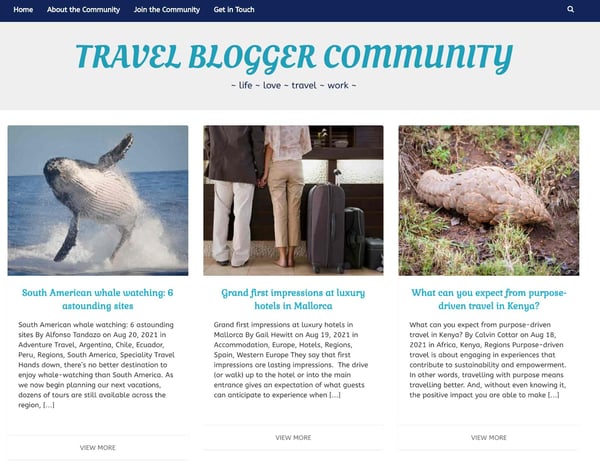
Image Source
Pro tip: Travel Blogger Community is a great example of a niche site that may also exist within your industry, so be sure to do some research if you’re going to implement a content aggregation strategy.
2. Flipboard
Flipboard is a popular blog aggregator that allows users to create a custom feed based on their interests.
What we like: Personalization allows you to create a profile, submit an RSS feed, and share your content. You can also create a personal storyboard with content related to your business and link to it on your website via social buttons.
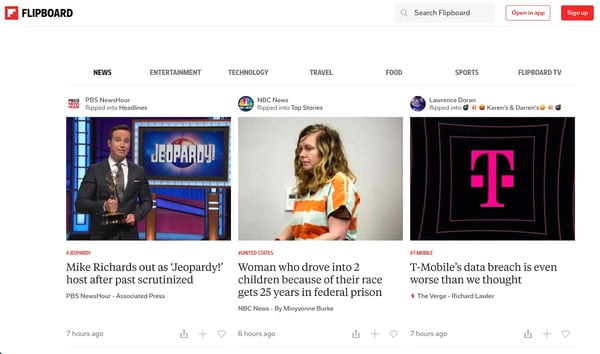
Image Source
3. The Web List
The Web List is a single-page content aggregator with original content from a variety of sources. It highlights the most popular items of the day at the top, then organizes other articles by source.

Image Source
News Aggregators
News aggregator sites compile content from various high-quality news sources. These sites can be for general news, location-specific news, or industry happenings.
4. Google News
Google News displays the top news stories for the day, saving users a trip to their search engine.
You can’t submit your content to the site as it is curated based on search history and location, but if your site gains traction, you increase your chances of being featured.
Best for: Customization. Users can customize their feed by “following” specific topics, sources, or searches.
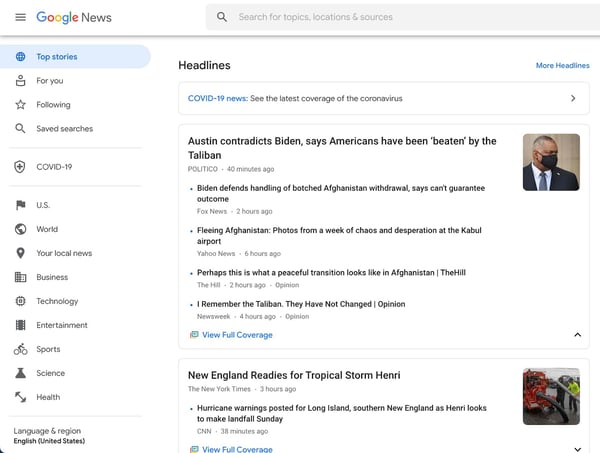
Image Source
5. AllTop
AllTop aggregates content from various topics and sources, such as top news sites and social media forums.
Users can search for topics of interest and get the top stories or just browse through the homepage.
Pro tip: AllTop sometimes accepts site submissions, so be sure to check back periodically if you want to feature your content.
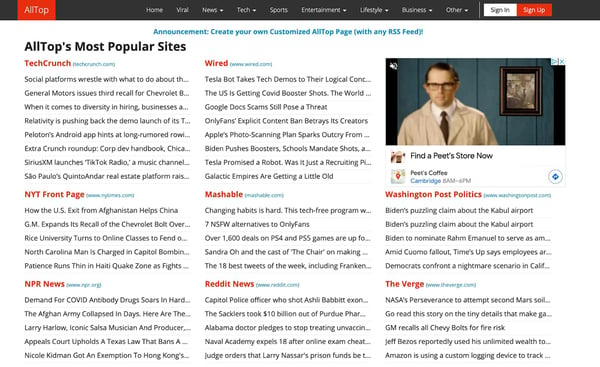
Image Source
6. Pocket
Pocket is an aggregation site that features a wide variety of content that users can customize to meet their interests by clicking a “Follow” button. You can also bookmark content to read on the go on your mobile devices — hence Pocket.
Best for: Anyone! There is a wide range of categories from tech through finance to travel.
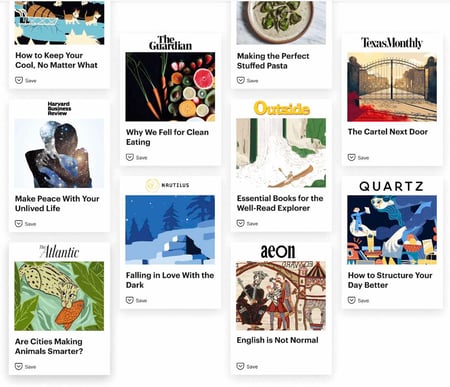
Image Source
7. WP News Desk
WP News Desk is a unique aggregator site that focuses on content related to the WordPress community.
You can’t submit your own content to be featured, but if you run a high-quality WordPress blog that is informative for users, you may find your site featured on the aggregator.
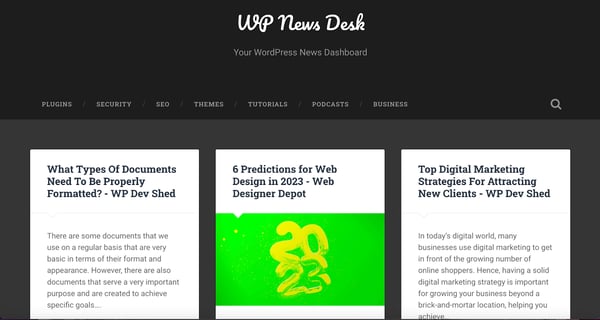
Image Source
8. Feedly
Feedly is a content aggregation site that’s focused on helping users create their own feed, so they aren’t overwhelmed with information overload.
Pro tip: The site has both free and paid plans, so users can aggregate content from as many sources as they want and across any niche.
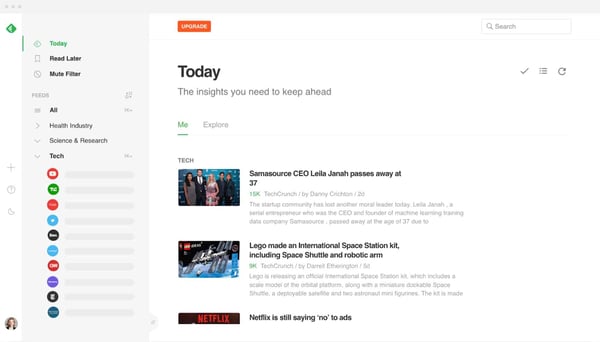
Image Source
9. Techmeme
Techeme is a niche news aggregator site that provides readers with the top news stories about technology-related topics, curated by editors.
In addition to the homepage, which features the day’s top stories, you can also choose the River view to see live updates or the Leaderboard view to find articles by topic.
Pro Tip: You can pay to have your content, event, or job listing posted on Techmeme, so if you’re in the tech business, this may be a great resource to tap into.
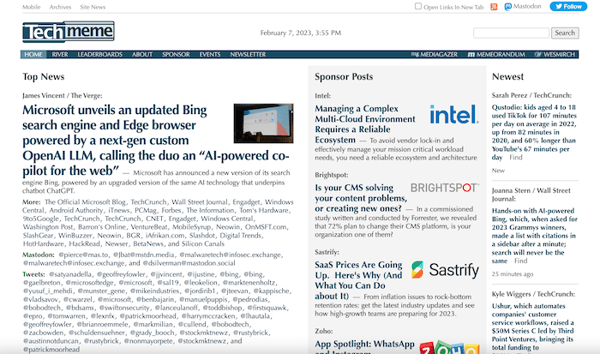
Image Source
Information Aggregator Websites
Information aggregator websites contain exactly that — information. This can include blog posts, news stories, links to social media content, and any information that users can benefit from.
10. Upstract
Upstract is a popular information aggregator. It allows users to choose the platforms they want information from to create a custom feed.
What we like: The crazy variety — it pulls from Reddit, Huffington Post, The Verge, Google News, Wired, and even TikTok, setting them all side-by-side.
While you can’t submit your site to be included in this aggregator, it’s nevertheless a powerful platform to be aware of if you’re going to start using content aggregation.
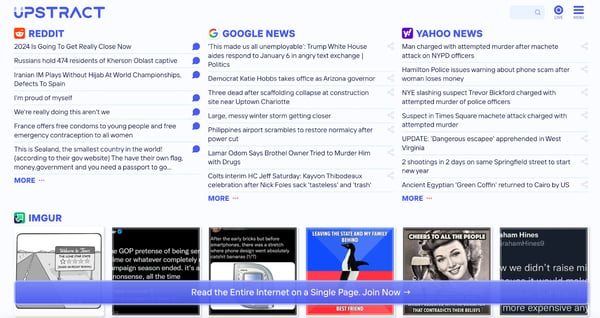
Image Source
11. Panda
Panda offers both a website and Chrome extension specifically curated for developers, designers, or just anyone who identifies as an entrepreneur.
It allows you to stay up to date with industry news from sources such as Hacker News, TechCrunch, and Github.
What we like: It is presented in an easy-to-use and aesthetically pleasing manner, making it the perfect content aggregator for anyone in the industry.
However, keep in mind that Panda doesn’t allow user submissions. Therefore, your feature may just come about if your content rises to the top of any of these notable news sites.
12. Reddit
Reddit is a household name, and if it isn’t in your home, then you must be living under a rock. However, it is also one of the most popular information aggregator sites.
It features trending topics from all different areas of interest while also providing a forum where people can comment and discuss the latest news.
Pro tip: As I’m sure you know, members of the site can submit content such as text posts, images, and links. Therefore, it’s a great tool for marketers to spread their word further.
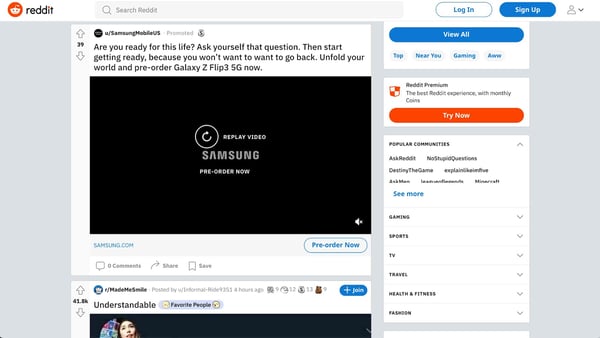
Image Source
Social Media Aggregators
Social media aggregators compile high-quality content from sources such as Instagram, Facebook, YouTube, and TikTok. Most social media aggregators help markets find user-generated content to share with their audience to build brand trust.
13. TaggBox
TaggBox is a social media aggregator focused on helping marketers develop brand trust and engagement through user-generated content.
You create an account, select the tags that are relevant to your business, and you’re shown posts across different social media platforms that your audience has made about you.
Pro tip: You also have the option to create a social feed of user-generated content to display on your own website, helping site visitors see your content in action and generate trust from other consumers.
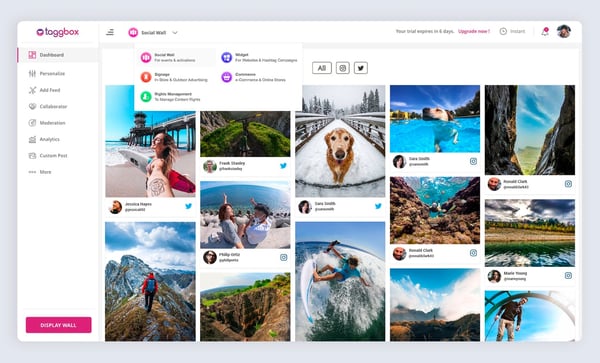
Image Source
14. Tagembed
Tagembed collects and curates engaging social media content related to your business that you can then display on your website.
What we like: You can generate a social feed from multiple sites and share the custom content within your site for all users to see.
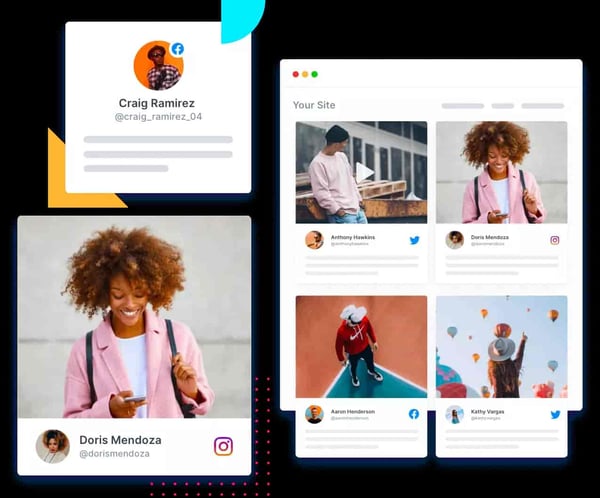
Image Source
15. Curator
You can draw posts from the most popular social media sites to create and share your own feed on your business’ website.
You can choose whether the posts automatically appear on your site or whether you manually approve each first. Curator offers free and paid plans.
Best for: Building brand trust by sharing customer posts with prospects and site visitors.
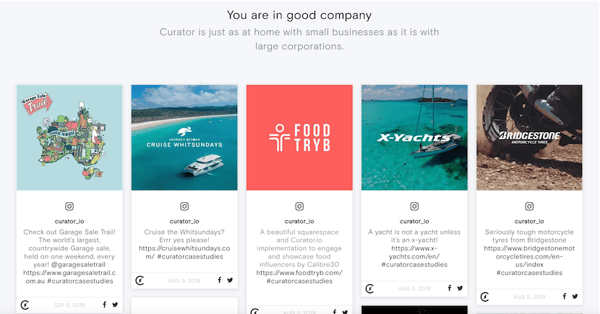
Image Source
While it may not make up the core of your marketing plan, content aggregators are a unique and exciting tool for marketers to use to share their content and gain exposure, while simultaneously becoming involved with your community.

Credit: Source link











